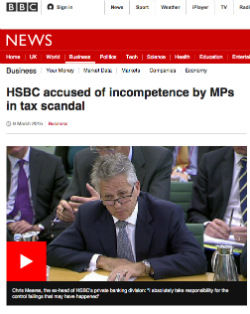Substituting guilt and forgiveness for shame
As a society we have become adept at holding people to account when something goes wrong. But are we looking down the wrong end of the telescope in our process of governance? By Dr Clive Morton OBE
The Public Accounts Committee Chair, Margaret Hodge MP holds HSBC Executives to account (BBC, 9 March)
The preacher in his sermon on Sunday took the story of Jesus driving out the traders and money changers from the Temple (John 2:12-25) and related it to today's experience of scandals (such as MPs expenses, greed in the City, tax evasion, loan sharks praying on those on low incomes, benefits).
 The theme set me thinking. The book I'm reading at present is The Spirit Level by Professors Richard Wilkinson and Kate Pickett which argues that much of the ills that beset developed nations are a product of increasing inequality in society which appears to increase the richer the society becomes.
The theme set me thinking. The book I'm reading at present is The Spirit Level by Professors Richard Wilkinson and Kate Pickett which argues that much of the ills that beset developed nations are a product of increasing inequality in society which appears to increase the richer the society becomes.
The US, the overall richest nation in the world, has the greatest inequality (or differential) between rich and poor, and seemingly as a product, high teenage pregnancy rates, suicide rates, incidence of obesity, mental health issues, and lowest trust, feeling of community and poor social relations.
Before we run away with the idea that this is an American phenomenon, the statistics that Profs Wilkinson and Picket use demonstrate the same patterns, to varying degrees, across the the developed world. Their analysis argues that inequity is increasing and in its wake social disintegration follows. What happened to the oft quoted politician's mantra of the "trickle down effect" to justify very high pay being good for the overall growth and well being of society?
Jesus became angry at the defiling of the Temple and the exploitation exercised by the traders and money changers. Jesus was on the side of the poor and oppressed. Have we gone soft on the standards of the Gospel? Have we adopted the politicians' pragmatism that a blind eye can be turned to "greed is good", that tax evasion is good financial planning? Or put faith that our laws, regulation, transparency will eventually 'out' the malefactors?
I want to suggest that we look down the wrong end of the telescope in our process of governance. We are forever reliant in our society on learned reports and investigations after the 'horse has bolted'.
As the former chief rabbi, Lord Sacks argues, we have substituted 'shame' for 'guilt and forgiveness' - honour is satisfied if one or two individuals are 'hung out to dry' and shamed after due process, rather than starting at the beginning with agreed moral values and ethics that form the bedrock of society, giving mutual trust and support whatever people's origins, class, status, ethnicity. This implies honouring our fellow citizens with dignity, setting standards which we keep to, involving Jesus's teaching on acceptance, forgiveness and a "theology of brokenness" that Ronald Rolheiser articulates.
I would also argue that the current mores that create and idolise the super-rich is not just bad for society as whole and the poor in particular, but actually bad for the super-rich themselves.
I have worked with wealthy entrepreneurs that operate internationally and an odd phenomenon emerges amongst them - they become stateless and community-less! I can see a full circle arcing between those at the bottom end of society - those who are homeless, stateless, and without community, right to the super-rich who have 'homes' they don't live in in many locations around the world in gated communities isolated from the society in which they reside, with few acquaintances other than their virtual networks and immediate 'hired helps' and spend effort fending off family relations who might "be on the make". Exceptions exist, of course, of wealthy philanthropists, aka Carnegie "a man who dies wealthy, dies disgraced". Hence we should be on the side of a more equal society for all our sakes.
Jesus's teaching offers joy where sorrow predominates. Whether we focus on "what does it profit a man (who has filled his barns with worldly goods) when his soul is required of him" for the rich to recognise priorities; or the promise of "living water" to all who believe that can give joy, comfort and fulfilment; we have the opportunity, just as Jesus modelled in his behaviour, of building forgiving communities in love and tackling injustice at the same time. At source, rather than an addiction to retrospective 'holding to accounts' with a focus on public shaming.
Dr Clive Morton OBE is a former civil engineer and Human Resources director, and is currently an Associate Professor at Middlesex University Business School. A member at Park Road Baptist Church, Peterborough, he also runs retreats in Italy with his wife, Florence. www.umbrianretreats.com
Baptist Times, 11/03/2015